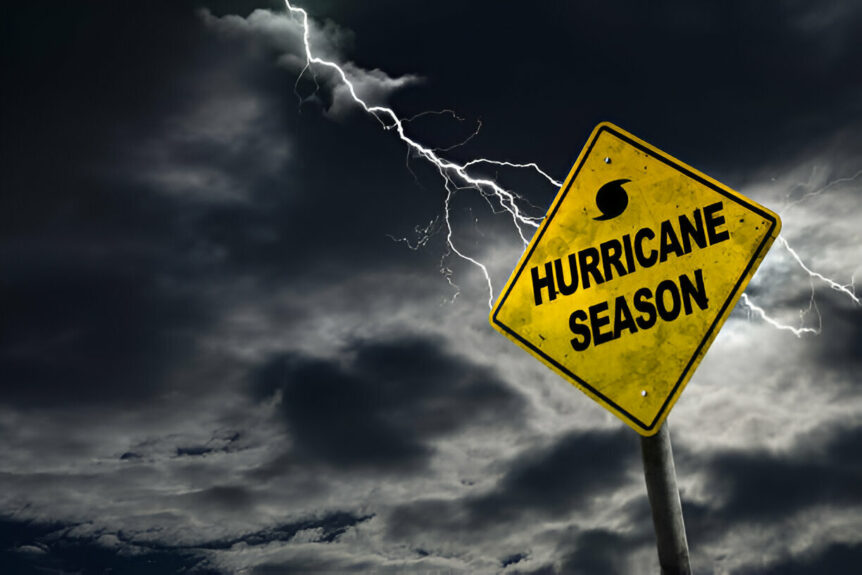As Florida gears up for another hurricane season, the importance of Hurricane Preparedness Week, which runs from May 5-11, cannot be overstated. With memories of past storms like Hurricane Idalia and Hurricane Ian still fresh, this week serves as a crucial reminder of the need to be ready. These reminders underscore the critical importance of readiness, regardless of whether you reside inland or along the coastline.
Hurricane Preparedness Is Critical for the Busy 2024 Season
As the calendar inches closer to June 1st, marking the commencement of the 2024 Hurricane Season, the urgency for preparedness grows exponentially. The National Oceanic and Atmospheric Administration (NOAA) and the National Hurricane Center are issuing repeated warnings, underlining the gravity of the situation. National Hurricane Preparedness Week stands as a reminder, urging individuals and communities to take proactive measures to safeguard lives and property.
Reflecting on the harsh lessons learned from past hurricanes, such as the unforgettable impacts of Hurricane Idalia and Hurricane Ian, the imperative for preparedness becomes abundantly clear. The devastation wrought by these storms left indelible scars—communities ravaged by storm surges, neighborhoods submerged in floodwaters, and landscapes scarred by relentless winds. The images of destruction serve as a stark reminder of the unforgiving nature of these natural phenomena.
Preparedness is our greatest asset in the face of uncertainty. By heeding the warnings of NOAA and the National Hurricane Center and embracing the lessons learned from past experiences, we can enhance our resilience and readiness for the challenges ahead. National Hurricane Preparedness Week serves as a pivotal moment for reflection, education, and action—a time to come together as a community and prepare for the storms on the horizon.
How to Prepare for a Hurricane
What You Need in Your Hurricane Kit
Building a comprehensive hurricane kit is not just a task; it’s a lifeline during the chaos of a storm. In addition to the essentials mentioned earlier, consider adding:
- Essentials: Stock up on water and non-perishable foods, secure necessary medications, and protect important documents to ensure you have what you need when you need it.
- Specialty items: Include items tailored to your family’s unique needs, such as baby formula, diapers, or pet supplies.
- Entertainment: Pack board games, playing cards, or books to keep spirits high during power outages and downtime.
- Comfort items: Remember to include blankets, pillows, and comfort foods to provide a sense of security and normalcy during the storm’s aftermath.
- Community resources: Research local emergency shelters and community resources, such as food banks and medical facilities, to access assistance if needed.
More: Hurricane Preparedness for Pets: 5 Things to Do Before the Next Storm
Make an Evacuation Plan and Know Your Zone
Evacuation planning is not just about knowing where to go; it’s about knowing how to get there safely and efficiently. Take these additional steps to streamline your evacuation process:
- Transportation readiness: Ensure your vehicle is in good working condition and topped off with fuel well before a storm’s arrival.
- Evacuation routes: Familiarize yourself with multiple evacuation routes to avoid traffic congestion and road closures.
- Communication plan: Establish a communication plan with family members and loved ones, including designated meeting points and emergency contact numbers.
- Special considerations: If you have elderly relatives, individuals with disabilities, or pets, make special arrangements for their evacuation and care.
Get Your House Ready Now
Protecting your home from hurricane damage requires proactive measures and attention to detail. Consider these additional steps to fortify your home:
- Structural reinforcements: Invest in hurricane straps or retrofitting measures to secure your roof and prevent wind uplift during storms.
- Water intrusion prevention: Seal windows, doors, and other vulnerable openings with hurricane-resistant materials to minimize water infiltration.
- Flood mitigation: Elevate electrical appliances and install flood barriers or sandbags to prevent water damage in low-lying areas.
- Generator safety: Familiarize yourself with generator operation and safety protocols, including proper ventilation and fuel storage practices.
- Insurance review: Review your homeowner’s insurance policy to ensure adequate coverage for hurricane-related damage and losses.
We’re Here to Support You During Hurricane Season
Legal assistance can be invaluable in the aftermath of a hurricane, helping with insurance claims, property damage assessments, and other legal challenges. Contact RRBH Law at 305-800-4663 to schedule a consultation and safeguard your rights and interests.
As hurricane preparedness week unfolds, let’s embrace the opportunity to strengthen our resilience and preparedness as individuals and communities. By taking proactive steps and supporting one another, we can weather any storm that comes our way and emerge stronger together.

